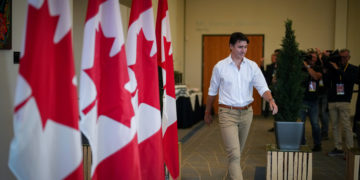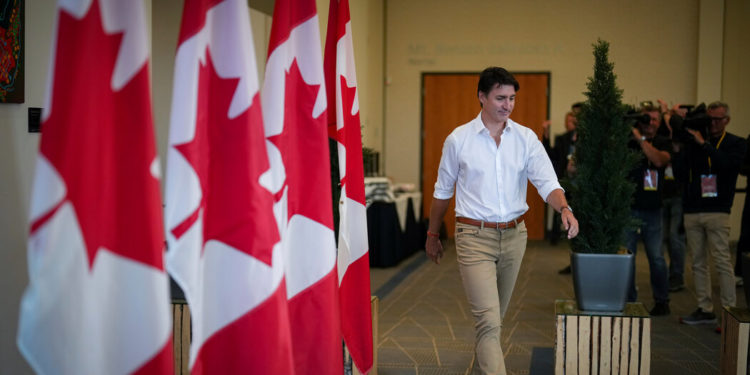Prime Minister Justin Trudeau’s Liberal Party has lost a Parliament seat it had held for decades in a special election in Montreal, a devastating defeat that is likely to increase pressure on Canada’s deeply unpopular leader to resign.
The Bloc Québécois, a national party that supports independence for Quebec, narrowly won the race that was held on Monday, according to final results released early on Tuesday morning. It was the Liberals’ second stunning election loss in three months.
The result underscored how support for the Liberals has evaporated, even in their last few strongholds, ahead of the next general election, which must be held by the fall of 2025 but is likely to take place in the spring. Mr. Trudeau has pledged to lead his party in that election, saying over the weekend that he would not quit even if the Liberals lost on Monday.
The defeat could set up an endgame for Mr. Trudeau’s third term in office. The main opposition Conservative Party is likely to redouble its efforts to quickly bring down his government, as polls predict the Conservatives cruising to a landslide in the next election. For the past year, Mr. Trudeau’s approval ratings have stagnated just above 20 percent and trailed those of Pierre Poilievre, the Conservative leader, by double digits.
To survive, Mr. Trudeau could increasingly call on the Bloc Québécois and another small opposition party, the New Democrats. Both might prefer dealing with the Liberals to eke out victories for themselves, rather than face a potential Conservative majority that could easily pass legislation on its own.
The election in Montreal, held to fill a single vacant seat in Parliament’s House of Commons, assumed outsize significance because it was seen as a referendum on Mr. Trudeau.
After his party unexpectedly lost a special election in June — in Toronto, another Liberal redoubt — the prime minister faced calls from within his own party to step aside. Mr. Trudeau rejected the criticism, instead using his powers as party leader to quash internal dissent.
The Conservatives now enjoy an overwhelming lead in the polls across Canada — except in the French-speaking province of Quebec, which amplified the importance of Monday’s special election.
Mr. Trudeau’s popularity has plummeted as his government has seemed increasingly out of touch with the concerns of ordinary Canadians. On issue after issue — the high cost of living, a housing shortage, problems stemming from the record number of temporary workers or foreign students — his government has reacted with policy changes only after being pummeled by the opposition.
The government has also been accused of minimizing the threat of foreign interference in Canadian politics. It long opposed a public inquiry into the issue, which is now underway and has uncovered attempts by China and India to meddle in Canadian elections.
In the weeks leading up to Monday’s vote, the Liberal candidate had been locked in a tight three-way race against Louis-Philippe Sauvé of the Bloc Québécois and Craig Sauvé of the left-leaning New Democratic Party, who came in third on Monday. (The two are not related.)
The district, called LaSalle–Émard–Verdun, had been considered a reliable Liberal seat: in the party’s grip almost continuously for more than half a century, and the base for a former Liberal prime minister and a former Liberal justice minister.
In the last election, in 2021, Mr. Trudeau’s party won the district — made up working-class and gentrifying neighborhoods, with linguistically and culturally diverse residents — by more than 20 percentage points.
This time, things went very differently.
After the seat suddenly became vacant early this year, three competitors launched campaigns to become the Liberal candidate. They said senior party officials had assured them that it would be an open nomination, and they were angered when Mr. Trudeau abruptly handpicked a city councilor named Laura Palestini to run.
With many voters expressing fatigue over Mr. Trudeau’s leadership, the prime minister was conspicuously absent from the local campaign, even though his own electoral district lies a short drive away.
Mr. Trudeau’s face was nowhere to be seen on Liberal Party campaign posters, though other parties featured their leaders. The prime minister made only two low-key campaign stops, including one over the weekend to a senior home. That appearance was closed to the news media.
Ms. Palestini refused nearly all interview requests, and her staff declined to let journalists accompany her on the campaign trail.
In one rare interview, she tried to distance herself from Mr. Trudeau. “It’s about me. It’s not about the P.M.,” she told the Canadian Press, referring to the election and to the prime minister.
By contrast, the candidates for the New Democratic Party and the Bloc Québécois ran energetic campaigns. Leaders for both parties showed up frequently in the district, at the southern point of the island of Montreal, to back their candidates.
For Catherine Auclair, meeting the New Democratic leader, Jagmeet Singh, in person was the clincher. Ms. Auclair, 27, had been hesitating between the New Democrats and the Bloc Québécois, but said she was won over after hearing Mr. Singh speak on the housing crisis and other issues.
“I found Jagmeet Singh close to the people, and seeing him more than once here made me feel that he cared about our issues,’’ Ms. Auclair said after voting on Monday.
At age 23, Jackson Hofer had now voted three times in his life — “once for Trudeau and now two times for Jagmeet Singh,” as he put it.
Mr. Hofer, who was studying to be a pilot, said he felt that Mr. Trudeau has been a good leader, citing his policies on the environment and L.G.B.T.Q. rights.
“He’s done a good job for the nine years he’s been in power,” Mr. Hofer said. “But nine years, maybe it’s time to go.”
On Monday, a second special election to fill a vacancy was held in Winnipeg. But the Liberals were not contenders in that district, which remained in the hands of the New Democratic Party.
The post Another Blow to Trudeau: Liberals Lose a Long-Held Seat appeared first on New York Times.



















